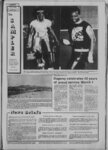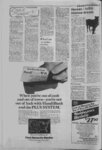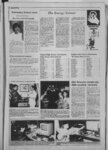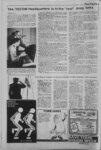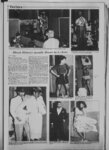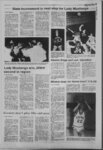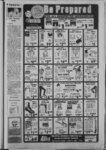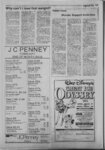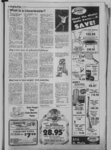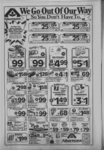| OCR Text |
Show b4 r Yes , T E C O M - H eadq u a rt e rs by Raylund Pryor "Some people say the real Army consists of just combat arms" said Sfc. ((P) James D. Richardson, Headquarters U.S. Army Test and Evaluation Command (HQ TECOM) chief legal clerk, "I disagree. I think the real Army is a professional organization that has ia specific mission to accomarms soldier plish during war or peacetime. The combatdon't have the certainly fights the war for you, but if you not going administrative and combat support units, you're war. win to the Some people tend to classify certain jobs and sometimes entire units as not being a part of the real Army. This to stereotyping also holds true for some soldiers assigned HQ TECOM. i s i ri . the rea lPtteTil"uervisor S? 3 f muchas they Supervisor release people for won't who traimng." . soldiers attend training, we 3N let t doesn "If a supervisor HQ TECOM U find ?ut why; .mwJMb excuse we can live 0 tney Traimng NCO. A memorandum 00 reiated. iss it with, and usually outlines training, Aguigui with supervisors added! fWe good cooperation havpretty letting soldiers attend training. Communication is the key vou've eot 1 Working around, with and for civilians is not all that common for an enlisted soldier. "Ibis is the first place Ive been assigned where there are so many civilians to work with," said Sp5 Robert A. Underwood, administrative specialist. "It's another job in a totally different environment. You don't feel like you're under the pressures you encounter in a military unit." "It's Civilian dominated here," said Maj. Terry M. Jessup, Secretary of the General Staff, 'The hours are predicated by the civilian work schedule. This is a high level headquarters environment as opposed to a field headquarters." "I consider Headquarters TECOM an unusual type of assignment because we work mostly with civilians," said SSgt Dock H. Autry Jr., intelligence analyst. . the SherXenLmlementof Richardson "Once the civilian supervisor understands tnat, operational mission and most do, they find out that their down to simple comes will be enhanced in the long run. It . communication. and state I can send out a training roster h a thatfeMl deriS will report to training on half of time. Without communication with the supervisors them show up," explained Richardson.deal with civilians and "So Ive found out that when you the coJtesy of military supervisors, you giveon.them their misIt s going ing them about whats going me it to helps the sion in the long run and most importantly soldier professionally, Richardson said. such-and-suc- Headquarters differs from other units Autry explained that there are many differences between HQ TECOM and other units. Some of these include forma- tions, physical training and the work schedule. "Some units may have several formations a day, while a formation for HQ TECOM is rare. Although we do have physical training here, it's not like in a larger unit where there are more than ten people showing up. Our PT is controlled, but its more of a self placed, self motivated program," said Autry. Another difference is that soldiers assigned to HQ TE- 1 f Army-- 9 . wasn't at training. "Headquarters TECOM is a unit that you can't really call the real Army," said SSgt. Robert A. Watkins Jr., TECOM personnel specialist. "It's the real Army in a sense, but the ; majority of the command is civilian. Less than 30 enlisted soldiers are assigned to the headquarters where they work with more than 400 Department of Army civilians and 50 officers. 1 55 ' . are attached to Headquarters, Headquarters Company, Troop Command, Aberdeen Proving Ground for COM quarters, rations and Uniform Code of Military Justice. "It isn't your normal military working environment, said Autry, "but theres a lot to be learned here." "Working at the headquarters gives you a chance to learn more about computers than. you might elsewhere, because TECOM is becoming very computer oriented," Autry said. Because civilians stay in their positions much longer than most military, the enlisted soldier assigned to HQ TECOM can take advantage of learning from the civilians. "The fact that many civilians do not move as frequently as we in the military do, gives them the advantage of knowing what's been going on, said SP6 Ramona C. Rameriz, legal clerk. "If. there's a situation that comes up and its que to you as a service member, the civilian has probably experienced the problem previously and knows how to handle it. This is a valuable process for the soldier." TECOIVFs soldiers are soldiers first Besides learning from their civilian counterparts at HQ TECOM, the soldiers here have the same obligation to military training as soldiers anywhere else. "When you have a military supervisor and you have to attend some sort of military training, your supervisor knows why. But with civilian supervisors, they may feel that the job comes first and military training only comes when the job is done," said SSgt Judith a. Foss, HQ TECOM Equal Opportunity NCO. "Then the supervisor has to answer as to why the soldier , Staff work not for.everyone . and not every HQ TECOM is a special type of assignment soldier is cut out for it. "Soldiers are interviewed when they arrive here to see if Watkins. they have the proper frame of mind, explained A of lot people watch "This is a highly visible assignment. you closely. We have to have the best, Watkins said. and above. TECOM generally uses 's E-3- or but its "Thats not to say we won't use an or first her as his hard for a soldier to work for HQ TECOM assignment. Theyll think the Army is like this everywhere solyou go, and its not. HQ TECOM will spoil aI first term dier. If I had come here on my first tour, don't think I E-- 2, E-- l. would have made it this far, said Watkins. "We have carpeted floors, air conditioning, heat, and electric typewriters. When you go somewhere qlse its going to be different, said Sp4 Steve Washington, administrative specialist. "Im going to Alaska in July, and I know things are going to change. Richardson says that leadership is the key to helping the young soldier adapt to this type of environment. "This is a unique assignment," explained Richardson. "Its a special assignment which one should feel proud to be associated with. "I think this environment causes the military to be closer de corps, were our own collect-seleknit. Theres a unity-espr- it ct little group and we're the best," Foss said. "TECOM is an important part of the Army," said Richardson. "TECOM is responsible for testing much of the equipment that eventually will be used by the individual soldier. The quality of work we perform here will determine the quality of equipment going to the soldier and ensures that we remain the best Army in the world First black medal of honor holder of the Vietnam War buried capital. by Richard C. Gross, UPI Staff Writer Editors note: This article Heavy fog enveloped the rows of small white tombstones on the hillsides and blurred the outlines of a is reprinted with permission of managing editor, United Press International (UPI) Retired Sgti 1st Class Lawrence Joel became the first black medal of honor holder of the Vietnam War to be buried at Arlington National Cemetery Monday in a solemn ceremony shrouded in lone bugler sounding the haunting notes of taps; a chilling, fine mist soaked turf and condensed on the white marble stones. Joel, who retired April 30, 1973, after. 27 years in the Army, was a Specialist 5th Class and a medic when his unit was ambushed by the Viet Cong Nov. 8,' 1965, north of Saigon. Although twice wounded, he tended to the wounds of his fellow soldiers while ignoring the in- - fog. Joel died of diabetes at 55 N.C., Feb. in Winston-Sale4. m, After ceremonies attended by 34 members of his family, and 25 retired and active duty soldiers from the Armys 173rd Airborne Bri- ; ' gade, with which he served, Joel became the 323rd Me-- , dal of Honor hero to be in- tense fire that erupted around him. "Completely ignoring the warnings of others and hispain, the citation accompanying his medal of honor terred at Arlington, whose rolling hills overlook the Potomac River and the nations said in. part, "he continued his search for wounded, ex-- 1 posing himself to hostile fire and, as bullets dug up the dirt around him, he held plasma bottles high while completely engrossed in his life-savi- ng mission." "After being struck a second time, and with a bullet' lodged in his thigh, he treated more menb efore his supplies ran out. With a new pack; he crawled through an intense hail of gunfire to continue to treat the wound- ed until his own evacuation was ordered. "I knew during those few hours that there was no greater man who walked on earth, eulogized Lt, Col. James Hutchens, a chaplain now with the National Guard in Washington, D.C. who had been a chaplain with Joels unit in Vietnam. "He was bigger than life," he told the mourners in Arlington's Brick Chapel, the foe hueeine its 11 stained glass windows. "He was ab solutely indestructible, it was as though there was a shield around him. "Joel modeled for us and the world that day a man who was willing to lay down his life for his . brother, Hutchens said. Six pallbearers three white, three black slowly - carried Joel's coffin from the rear of the Cadillac hearse to the grave. A seven-ma- n honor guard flag-drape- d, fired three volleys. There is no special place in Arlington for medal of honor winners. Joel is buried in section 46, about 200 yards down the hill from the mast and crows nest of the Battleship Maine, whose sinking sparked the Spanish-America- n War. He was buried alongside a medal of hondor winner from that war, Navy Cmdr. Willard Miller, who died Feb. 19, 1959. (ARNEWS) Dl 882-119- 2 'mxiniixxx ix 2 North Main Tooele n Lifetime bbcoopomsI;, Membership In 1251 VIDEO STORES n Coast to Coast Only $ fl2so with 20 Free Movie Rentals 1 5"a mov,e rental may Exp,ms time; 1st 5 no other last 15 you required; ren 1 80(1 1 free rental! . Esaca f.1 ii r.iAncH .Virfve-- 'I -- v. ! ,, '.I..I-- ;4.'v5 r... ' .r1 6-1- 2 O Q 11 U |

